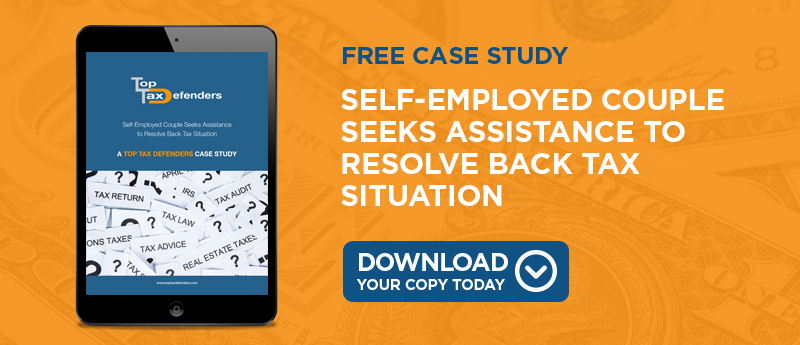
The IRS expects you to file and pay your taxes on time each year. When you fall behind with your returns, you put yourself at risk of steep fines and penalties and collection activities like wage garnishments or bank levies. You can get caught up with filing your returns and settle your back taxes by using these strategies.
Don't Avoid Talking to the IRS
The first strategy you should use involves keeping an open line of communication with the IRS about your tax situation. It is crucial that you do not ignore the IRS' phone calls and letters. Ignoring these attempts to communicate with you will only make your situation worse. Your back tax issue will not go away simply because you ignore it.
Instead, you should keep in contact with the IRS and fully explain your situation to them. The IRS may be able to help you work out a resolution to settle your account and help you avoid collection activities like wage garnishments, bank levies, and seizure of your assets.
Depending on your circumstances, you might be able to request a hardship deferment for paying your back taxes. A hardship deferment may be granted if you:
- lost your job
- suffer from a serious medical condition or disability
- experienced the death of an immediate family member
- were recently divorced
You should consult with a tax professional before asking the IRS for a hardship deferment to ensure you qualify for it.
Ask for a Penalty Waiver
When you owe back taxes, the amount will be increased by penalties and interest. These extra fees can make paying your tax debt more difficult.
You can ask the IRS for a penalty waiver, however. When you request a penalty waiver, you could possibly have these extra costs eliminated, allowing you to owe just the back tax balance. You may need to speak with a tax professional to make sure you qualify for a penalty waiver, however.
Submit Your Current Tax Return on Time
While you are dealing with your back tax issue, it is crucial that you continue to file and submit your current tax return on time each year. You should file the most current tax return while your account is under review by the IRS.
You should also ensure you file your current year's return on or before the April filing deadline. If you owe taxes for the current tax year, you should ask the IRS for a payment arrangement so you do not fall further behind with what you owe to the government. You can request either an installment agreement or another type of payment arrangement to demonstrate to the IRS that you are willing and ready to pay on what you owe for this tax year.
Give Priority to Your Back Tax Returns
You should also give priority to filing and submitting your back tax returns. The IRS is the most powerful creditor in the country and can use a variety of collection activities to recoup what you owe to the government. If you fail to pay what you owe, it can use a variety of methods to collect on your debt including:
- Wage garnishments
- Bank levies
- Seizure of property
You want to pay off the debt as quickly as possible to avoid these collection attempts and the financial hardship that can come with them.
Use a Credit Card to Settle Your Balance
If possible, you should use a low interest rate credit card to settle your account with the IRS. By using a credit card with a low interest rate on it, you can satisfy your tax debt and repay your credit card over the course of several months.
Using a credit card can be a better option than utilizing a payment arrangement with the IRS because it satisfies your debt in a single payment. You also avoid penalties and fees that can come with paying off what you owe to the IRS through a monthly installment arrangement.
Start with Your Last Year's Tax Filing
While you are dealing with your back taxes, you can get organized and ready to pay off what you owe by starting with the last year that you filed taxes. You should get copies of earning statements and other paperwork from that year and then every year after that for which you failed to file taxes.
If you do not have the original income earning statements on hand, you can get copies from your local IRS office. You should also consult with a tax professional who can double check the numbers on your back tax returns and make sure you will not be penalized for failing to report an accurate amount of income for each year.
Figure Out How Much You Owe the IRS
As you file your back tax returns, you should go through each one and make sure it is prepared according to the IRS instructions. At the end of each form, you will find out how much you owe the IRS or if the IRS owes you a refund.
If you are not sure of your filing capabilities, you should have a tax professional look over your returns to make sure the math is correct. Your tax pro can catch any costly errors before you submit your returns.
Submit the Past Tax Returns with a Small Payment for Each Debt
When you send in your tax returns, you should submit $5 for each tax debt that you owe. Sending in $5 for each tax debt will immediately get you back into compliance with the IRS. It also will show the IRS that you are serious about starting to repay what you owe right away.
Ask for a Payment Arrangement on What You Owe
If you cannot pay in full what you owe, you should ask the IRS to allow you one of the available payment options for your tax debt. These options include:
- An Offer in Compromise or OIC
- Currently Not Collectible Status or CNC
- A monthly installment agreement
- Monthly credit card withdrawals
- Check withholding
These options satisfactorily address your back tax issue and in some instances allow you to pay off what you owe in a manner you can best afford.
Get Help from a Tax Specialist
If you are entirely unsure of how to best deal with your back tax issue, you should hire a tax specialist to assist you. Your tax professional can suggest the best methods for resolving your debt.
He or she may also be able to help you settle your tax debt for less than what you owe. A tax professional can advise you on how best to deal with the IRS whenever you owe back taxes.
The IRS will collect on debts that you owe to the government from past tax years. Rather than have your wages garnished or your assets levied or seized, you can resolve your tax debts by filing your back returns and asking for penalty waivers, payment arrangements, and other courtesies. A tax professional can best advise you on how to deal with filing back returns and satisfying your account with the IRS.



